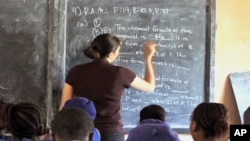Fifteen years after pulling out because of Sierra Leone’s civil war, Peace Corps volunteers are back in the West African nation. A look at the organization's work as the Peace Corps marks its 50th anniversary this year, March 1st.
Amanda Pease is one of the first Peace Corps volunteers to work in Sierra Leone in over a decade. She has been teaching science now for six months at St. Joseph’s, a high school in the east of the country.
For Pease, living in the roadside village of Blama, a day’s drive from the capital, Freetown, is a far cry from her coastal hometown of San Diego, California. It is also her first time to Africa.
Pease decided to sign up for a two-year stint as a Peace Corps volunteer after finishing a degree in Chemical Engineering at the University of California Los Angeles.
"I was trying to decide between going the academic route and doing a postdoctoral degree and go into industry and then I had been doing some volunteer work and the idea was always kind of floating around," Pease said. "There was kind of an option number three on the side, and as time went on and I thought about it more and more, I was so much more excited about that option. Just the idea of trying to give an opportunity to someone who would not maybe have it."
There are 37 Peace Corps members serving in rural schools across the country. Joel Wallach, co-director for Peace Corps here, says they have a long history in Sierra Leone.
"Sierra Leone has traditionally been a very welcoming country to the Peace Corps," said Wallach. "And there have been about 3400 volunteers in a 32-year history, up until 1994. We had been thinking about coming back for a few years, but a combination of the budget allowing us to and the security situation stabilizing made the timing right last year for us to come back."
In Blama, every day Pease comes home to a gaggle of young friends eager for her time.
But before she plays, she marks her students’ papers. As the school’s only Chemistry and Physics teacher, she has a lot to do.
As efforts to get more children through primary school in Sierra Leone are bearing fruit, many high schools are now overloaded with students. Science teachers are particularly scarce.
For Pease, one of the most surprising and challenging things about her experience so far is the lack of motivation among her colleagues and students.
"I had sort of a romantic idea coming to a developing country where everyone is super motivated but just does not have opportunity, " said Pease. "And that is not exactly how it is. Not that I am saying the opportunities are so great, because of course there are limited opportunities compared to America, but I think one of the biggest things is literally just motivation."
For St. Joseph’s deputy principal, Walter Sam, Peace Corps’ return to Sierra Leone is a welcome support to the challenges of providing quality education in difficult conditions.
"Oh, we have benefited immensely," Sam said. "In these two areas, from the year 2000 up to when Amanda came now, we have been hiring teachers on a part-time basis, paying them. So with the coming of Amanda, the school has really cut down on hiring those ones [people], especially in chemistry and physics."
What Pease loves best about her Peace Corps experience is the magical moment when a student understands chemical bonding or asks her for more exercises.
Pease says if she can do anything in her two years here, she hopes to be able to pass on the ‘can-do’ culture of her homeland and to absorb the joys of Sierra Leone’s slower pace of life.




